Voting for Ethics
This guide to ethical behavior should be required reading for every candidate for public office. As a former public official, I believe the greatest reward of public service is to make people's lives better...but that can only happen with candidates who are honest, ethical, and respect the dignity of those who elected them to office.
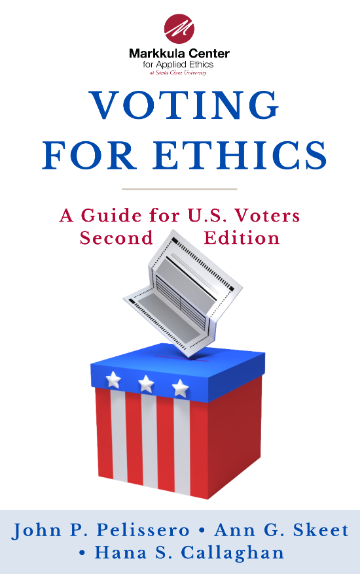
Voting for Ethics: A Guide for U.S. Voters, 2nd ed., Palmetto Publishing, August 2024.
Voting for Ethics is a non-partisan guide that equips U.S. voters to make informed decisions. It emphasizes identifying ethical candidates, irrespective of political affiliations.
The updated second edition delves into the role of artificial intelligence in politics and the importance of a candidate's commitment to the peaceful transition of power. This book is a call to action for voters to scrutinize candidates' integrity, ensuring their vote contributes to an ethical political landscape.
Purchase Voting for Ethics: A Guide for U.S. Voters from Amazon
Voting for Ethics in the 2024 Elections
Noon - 1:00 p.m. PDT Wednesday, October 9, 2024
A Discussion with Ethics Center Director of Government Ethics, John Pelissero and Senior Director of Leadership Ethics, Ann Skeet, coauthors of Voting for Ethics: A Guide for U.S. Voters, 2nd ed., about the 2024 elections and how to determine if candidates are ethical, are conducting an ethical campaign, and are fundraising in an ethical fashion. Pelissero and Skeet will address key topics from the book, including how ethics should be central to voters’ assessment of campaigns and candidates and the ways in which electoral campaigns have changed in the past few years, including the issues of truthfulness, integrity, and the responsible use of generative AI in campaigns.
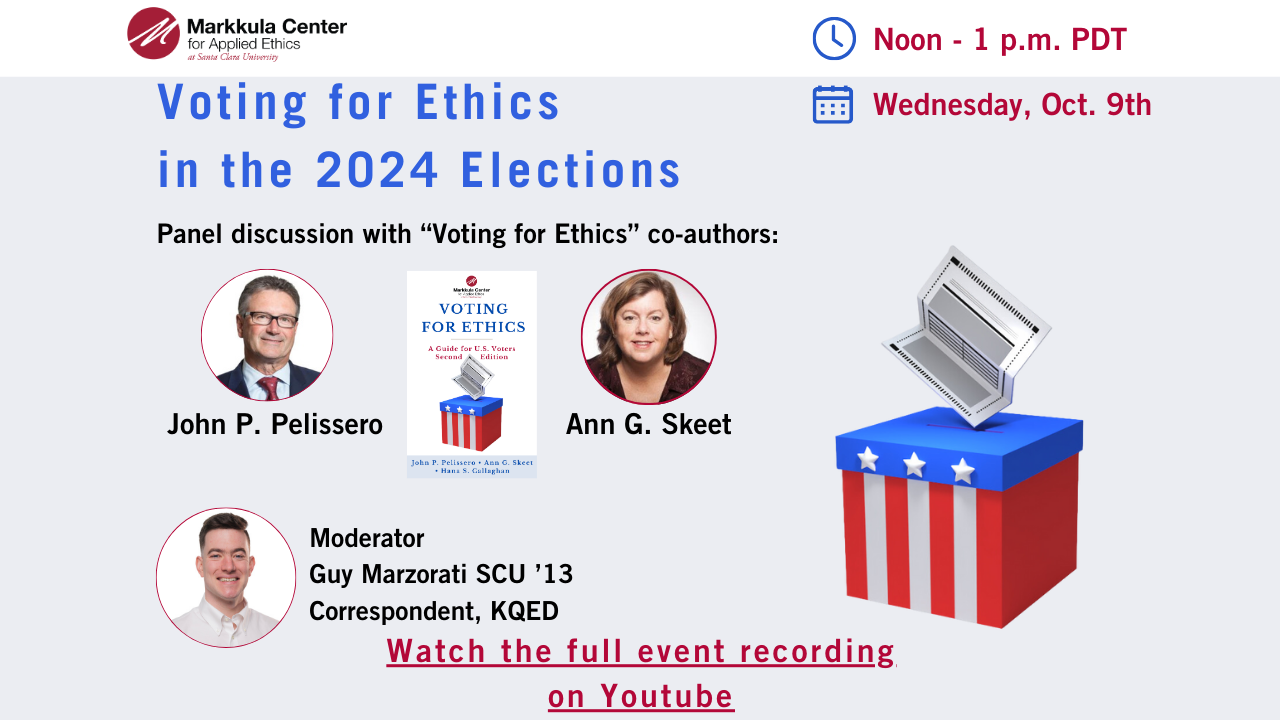
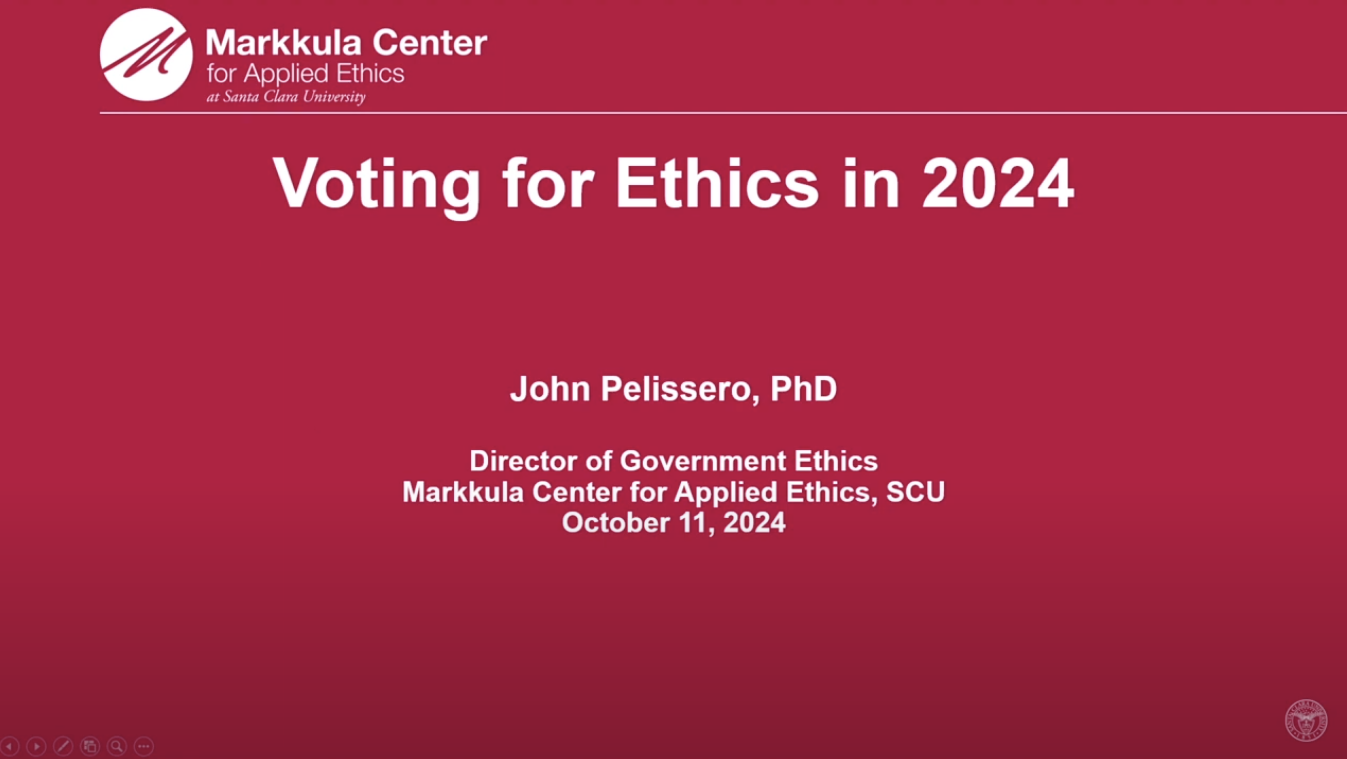
Voting for Ethics: John Pelissero at SCU's Grand Reunion Event
October 11, 2024
This event featured a discussion about the 2024 elections and how to determine if candidates are ethical, are conducting an ethical campaign, and are fundraising in an ethical fashion. Pelissero will explained how ethics should be central to voters’ assessment of campaigns and candidates and the ways in which electoral campaigns have changed in the past few years, including the issues of truthfulness, integrity, and the responsible use of generative AI in campaigns.
Voting for Ethics - The Video
About the Video
"Voting for Ethics" is a short video made possible by a grant from a generous donor who shares our vision to educate the public about ethics in the voting process and how to evaluate candidates to make more informed decisions.

Why did the affordability crisis, misinformation, immigration chaos, and endless wars not split the Black women’s vote? Civic duty and protecting hard-won freedoms.
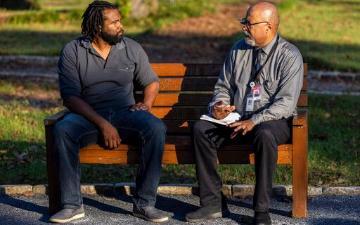
U.S. Journalism leaders offer lessons and moral framing to help political reporters better cover low-income and poor Americans as voters.
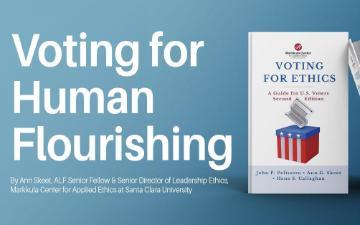
Increasingly, people’s identities are wrapped up with their politics, reinforcing the sense that we are part of tribes that cannot find common ground. Ethics can be that common ground.
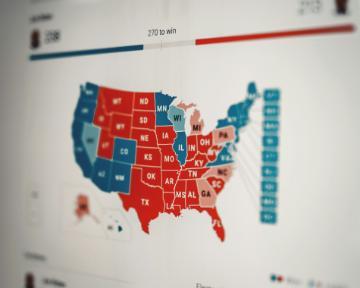
The Kamala Harris-Donald Trump presidential debate missed the voices of America's biggest category of 'swing voters'--low-income and poor people.

The Ethics of Voting: John Pelissero on Voting Rights and Voter Suppression
Are laws always ethical? How have voting rights recently been restricted within the United States? Are state officials abusing their power in unethical ways to change voting regulations?
John Pelissero, director of government ethics at the Markkula Center for Applied Ethics discusses voting rights, disinformation, discrimination, and voter suppression.
About the Authors



For More Information
The Markkula Center for Applied Ethics staff and affiliated scholars can provide commentary and background information for media on a variety of government and ethics related topics including voting, elections, and campaigning.

John P. Pelissero, Ph.D.: Pelissero is a former director of government ethics at the Ethics Center and Professor Emeritus of Political Science at Loyola University Chicago, where he served on the faculty for 35 years until 2020. An accomplished researcher and teacher in various areas of American politics, he is a specialist in urban politics and public administration. He has published dozens of articles in political science journals and has published two books. He was chairperson of the Department of Political Science, served seven years as provost and chief academic officer, and led Loyola University Chicago as interim president for one year. Pelissero promotes the values of ethical awareness and social justice in education and community action.
For additional details, please see the Press Release for "Voting for Ethics," or contact Joel Dibble, Senior Director, News and Public Relations at jdibble@scu.edu.